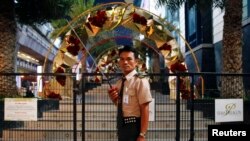Police in Thailand's capital announced increased security Monday for public places, such as bus and train stations, after a pair of blasts outside a popular central Bangkok shopping mall. Two people were slightly injured. In the Thai capital, there are concerns the explosions could usher in a new phase of violence after a relatively calm period since last year's coup.
The Royal Thai Police say they have not yet identified any suspects in the twin bombings outside the Siam Paragon shopping center.
The devices, placed behind an electrical transformer, slightly injured one man, panicked pedestrians and commuters, and caused a 30-minute closure of a major mass transit rail station Sunday evening.
The explosions also damaged a small public registration center of the Bangkok Metropolitan Authority, which is expected to be closed for repairs for one week.
The national police chief, Somyot Pumpanmuang, said the homemade pipe bombs contained timers for triggering the detonations.
The police chief said "from the location and material of the bombs, they were not designed to injure or kill anyone. They were intended to threaten and create chaos."
Prime Minister Prayuth Chan-ocha has ordered authorities to review closed-circuit television footage and said there had been no prior warning given about the blasts.
The junta leader told reporters Monday the incident demonstrates martial law must remain in effect because "there are bad people disrupting the peace."
The prime minister vowed to find ways to "severely punish" whomever is responsible.
Sources on both sides of Thailand's polarized political spectrum agree the blasts were intended to send a political message.
Those who do not favor Thailand's military government are likely to be blamed, although no group has claimed responsibility and there is no evidence of organized opposition to the coup.
On social media Monday there was speculation that it could have been junta supporters who masterminded the blasts in order to justify a continuation of martial law.
The military has been in control of the country since May of last year when the civilian government was ousted in the latest in a long series of coups over the decades in Thailand.
Sunday night's blasts outside the upscale ten-story mall, which has more than 270 shops, was the first such violent incident since the May 22 coup.
The continuation of martial law was criticized last week by the highest-ranking American diplomat to visit Thailand since the military takeover.
In a speech at a Bangkok university, U.S. Assistant Secretary of State for East Asian and Pacific Affairs Daniel Russel also expressed concern the junta's "political process doesn't seem to represent all elements of Thai society."
Russel infuriated some members of the military government by stating that the impeachment of former prime minister Yingluck Shinawatra by the appointed National Legislative Assembly and the criminal charges filed against her leave the impression outside Thailand “that these steps could in fact be politically driven."
Russel met with Yingluck, as well as another former prime minister from the Democratic Party, and the junta's foreign minister, who is a retired army general.
But Russel did not meet with Prime Minister Prayuth, who carried out last year's bloodless coup when he was army chief.
The junta has made no secret of its goal to permanently eradicate the influence of the Shinawatra family from Thai politics. The family, led by billionaire business tycoon Thaksin Shinawatra, has been the force behind the winner of every election in the country since 2001.
Much of the kingdom's elites and the Bangkok middle class have supported military rule.
They credit junta leader Prayuth with ending a long period of political violence that played out on the streets of the capital.
Numerous academics and analysts, in and outside of Thailand who do not want to be named due to the kingdom's harsh lese majeste law, note that the majority of the elite want the country to be under military rule during the inevitable period of royal succession.
King Bhumibol Adulyadej (also known as Rama IX), who is 87 and currently the world’s longest serving head of state, has been in frail health for some years.
The heir apparent, Crown Prince Maha Vajiralongkorn, does not command the same level of respect as his highly-revered father.
